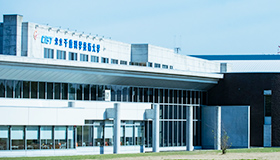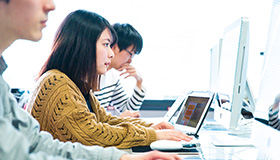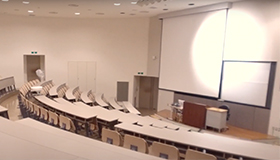Admission policy
Chitose Institute of Science and Technology has established a diploma policy, which serves as the basis of the curriculum policy and thus the actual education provided. Admission is based on the admission policy, which is as follows.
Graduate School of Science and Technology
The Graduate School of Science and Technology aims to develop human resources in research and development who are not restricted to a narrow field of specialization by integrating the fields of science, such as applied chemistry, materials science, biology and environmental science, and of engineering, such as electronics, mechatronics, information and communication engineering, software engineering, and service science, into a single division of science and technology.
In the Master’s Program, students are expected to deepen their knowledge and skills in specialized fields they have cultivated in the bachelor’s program and society, while simultaneously acquiring advanced communication skills with the hope of collaborating with others to discover and solve problems in a variety of social environments.
In the Doctoral Program, students are expected to deepen their expertise and research skills cultivated in the Master’s Program through research activities in the real world, and to be highly motivated to conduct autonomous and creative research with a broad antenna toward society as a whole, including the local community.
In the Master’s Program, students are expected to deepen their knowledge and skills in specialized fields they have cultivated in the bachelor’s program and society, while simultaneously acquiring advanced communication skills with the hope of collaborating with others to discover and solve problems in a variety of social environments.
In the Doctoral Program, students are expected to deepen their expertise and research skills cultivated in the Master’s Program through research activities in the real world, and to be highly motivated to conduct autonomous and creative research with a broad antenna toward society as a whole, including the local community.
Faculty of Science and Technology
1. University philosophies
- Chitose Institute of Science and Technology cultivates intellectual individuals of excellent character through education and research in a wide range of fields, including science and engineering that are useful in the world, and promotes academia and industry.
- Chitose Institute of Science and Technology supplies human resources and the inherent wisdom of the university to society as a knowledge base that is developed symbiotically with society in coexistence with the local community.
2. What we look for in our students
Chitose Institute of Science and Technology admits applicants who have the potential to become active members of society and display the abilities set forth in the university philosophies. The following is a description of the type of students we are looking for in our admission process.
- Those who are interested in natural phenomena, science and technology and their applications; those who wish to contribute to the development of society by applying their comprehensive knowledge and skills, ranging from basic knowledge of science and engineering to applied fields; and those who wish to take on the challenge of creating a safe and secure future where humans and the environment are in harmony
- Those who can explore matters with curiosity, imagination, and flexibility; those who are motivated to discover problems by setting goals and learning independently rather than being taught; those who set their own goals, apply themselves to achieve their goals, have ambition, and always work hard; and those who wish to become engineers who can collaborate with others through dialogue and can use their knowledge to discover and solve various problems in society of the future
3. Abilities we look for in our students
The Faculty of Science and Technology requires the following three elements of academic ability of those who wish to obtain an education based on the curriculum policy, which corresponds to the diploma policy.
- Knowledge and skills
In the first year, students learn basic knowledge of science and engineering, such as mathematics, physics, chemistry, biology, and information, which will lead the way to specialized studies. Applicants are therefore expected to have acquired basic knowledge and skills in the following subjects through daily studies at high school or equivalent schools.
・Mathematics: Mathematics I, Mathematics II, Mathematics III, Mathematics A, Mathematics B, Mathematics C
・Science: Basic Physics, Physics, Basic Chemistry, Chemistry, Basic Biology, Biology
・Information: Information I
Some high school curricula may not allow students to take all of these subjects, in which case, applicants are expected to show strong interest in mathematics, science, and information, as well as the willingness to learn the subjects they have not yet taken through self-study using the university’s e-learning system before admission. - Ability to think, judge, and express
After admission, students develop problem-finding and problem-solving skills through specialized education. It is therefore expected that students at high school or equivalent school level can derive answers based on formulas and also understand the related matters and mechanisms behind the questions while continuing their efforts to acquire the ability to derive answers through logical thinking. We hope that students set goals for everything they do, actively engage with others, utilize information obtained from literature and the Internet (media literacy), and continue to strive to achieve their goals.
Students are encouraged to develop their language literacy skills such as listening, speaking, reading, and writing to acquire the ability to express themselves. For this reason, the students are not only expected to acquire basic knowledge and abilities in science and math subjects but also in English, Japanese, and other subjects through daily study at high school or equivalent schools. - Attitude to learn both independently and collaboratively with diverse people
To achieve the goal of cultivating human resources who can play an active role in society, it is necessary to enhance such abilities as taking the initiative in problem-solving and collaborating in a team. To cultivate these abilities, we not only provide education that allows students to participate independently in experiments and practical training subjects, but also in lecture-based subjects. To enhance their ability to work in a team, students are also encouraged to work with others in project activities to identify issues and develop problem-solving skills. We are looking for individuals with a good understanding of these educational policies of the university and the willingness to actively acquire these abilities. At high school or equivalent schools, students are not only expected to actively interact with their classmates but also with students in different grades and multiple teachers through classroom life and extracurricular activities and thus develop their communication skills.
4. Basic policy for admissions selection
The Faculty of Science and Technology has established the following entrance examination system to confirm the above “abilities we look for in our students” and to accommodate students with diverse abilities and goals.
General selection (first and second rounds of the CIST entrance examination)
In the first and second rounds of the CIST entrance examination, students must take the Common Test for University Admissions beforehand. This serves to assess the basic knowledge and skills needed to study science and engineering. As for the individual academic achievement test, applicants must take the Mathematics and Science (choose one subject from Basic Physics/Physics, Basic Chemistry/Chemistry, or Basic Biology/Biology) tests for the first round of the examination, and the Mathematics test for the second round. Regarding the abilities we look for in our students (the three elements of academic ability), we specifically evaluate knowledge and skills, as well as the ability to think, judge, and express oneself. The school report is used as supportive reference material to confirm the applicant’s eligibility and course of study after admission.
Comprehensive type selection
Emphasis is placed on the status and results of the applicant’s work on assignments specified by the university. The applicant has to submit a statement of purpose and an essay at the time of application, and then has to complete an e-learning self-study assignment within a set period of time. The applicant’s attitude and ability to work independently and systematically is thus evaluated. Schooling includes group work and presentations based on the results of basic academic ability tests, while study themes are assigned to evaluate students’ qualities and aptitude as required to study science and engineering. As for the abilities we look for in our students (the three elements of academic ability), we place particular emphasis on the attitude to learn both independently and collaboratively with diverse people, and we comprehensively evaluate attitude through an interview, also incorporating the contents of the school report.
School recommendation type selection: School recommendation type A (Chitose area), school recommendation type B (nationwide)
Applicants who are recommended by the principal of their high school, secondary school, or college of technology are comprehensively evaluated, taking their knowledge, skills, interests, and commitment to learning science and engineering as well as their willingness to work hard and improve themselves into consideration. Evaluation involves an interview, basic academic ability test, essay, statement of purpose, recommendation letter from the principal, and school report indicating overall academic performance, special activities, club activities, and special skills and qualifications at high school or equivalent schools. All three elements of the abilities we look for in our students (three elements of academic ability) are evaluated.
Students selected through school recommendation type A (Chitose area) will study through lectures and projects focused on the Chitose area of Hokkaido, where CIST is located, after admission. The aim is to develop human resources who can identify and examine contemporary local problems and issues and propose new mechanisms and services. The evaluation will place particular emphasis on the ability to empathize with this policy, understand the characteristics of the area through activities, recognize issues, and cooperate with local people to resolve these issues.
Students selected through school recommendation type A (Chitose area) will study through lectures and projects focused on the Chitose area of Hokkaido, where CIST is located, after admission. The aim is to develop human resources who can identify and examine contemporary local problems and issues and propose new mechanisms and services. The evaluation will place particular emphasis on the ability to empathize with this policy, understand the characteristics of the area through activities, recognize issues, and cooperate with local people to resolve these issues.
5. Key evaluation items of admission selection
| Test type | Selection method | (1) Knowledge and skills | (2) Ability to think, judge, and express | (3) Attitude to learn both independently and collaboratively with diverse people | |
|---|---|---|---|---|---|
| General selection | First-round exam | Common Test for University Admissions | ○ | ○ | |
| Individual academic achievement test | ○ | ○ | |||
| Second-round exam | Common Test for University Admissions | ○ | ○ | ||
| Individual academic achievement test | ○ | ○ | |||
| Comprehensive type selection | Statement of purpose | ○ | ○ | ||
| Essay | ○ | ||||
| Web-based learning materials | ○ | ○ | |||
| Basic academic ability test | ○ | ||||
| Group work and presentations | ○ | ○ | |||
| Interview and school report | ○ | ○ | ○ | ||
| School recommendation type selection ・School recommendation type A (Chitose area) ・School recommendation type B (nationwide) |
Essay | ○ | |||
| Basic academic ability test | ○ | ||||
| Interview, recommendation letter from the principal, school report, and statement of purpose | ○ | ○ | ○ | ||



